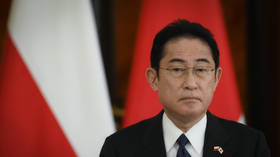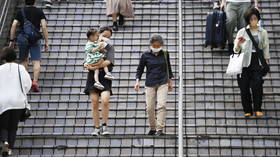Japan vows to fight hay fever crisis

Japanese Prime Minister Fumio Kishida has called for immediate government action to counter a hay fever epidemic, afflicting tens of millions of people nationwide, after the pollen count surged in some areas to the highest levels seen in a decade.
“Hay fever is an issue that can be said to be a social problem in our country,” Kishida said this week, as reported by the Japanese daily Mainichi. He added that meetings of relevant ministers will be held “to share information and work on effective countermeasures,” as “we want to achieve results.”
The allergy affects around 40% of the Japanese population and has been blamed for a downturn in spending and productivity in the world’s third-largest economy. A 2020 study of Japanese sufferers of the malady suggested that about 80% admitted to a loss of productivity as a result of their symptoms, which include sneezing and congestion.
Another study by electronics giant Panasonic estimated that hay fever contributed to a daily economic loss of 221.5 billion yen ($1.68 billion).
“Hay fever is said to be a national disease,” said Taro Yamada of the ruling Liberal Democratic Party this week. “If a system that plays the role of a command post is created and countermeasures are taken, it will be a popular policy.”
Yamada added that “the prime minister’s name will go down in history” if hay fever is brought under control.
Unseasonably warm weather in Japan is thought to have exacerbated the situation for sufferers who are facing the highest pollen levels recorded in a decade in Tokyo and 11 other prefectures. Pollen, a fine powder emitted by plants during their reproductive cycles, is the root cause of hay fever.
Some medical dispensaries have recorded a doubling in sales of therapeutic treatments such as antihistamines compared to the same period of 2022, with some employers providing workers with “hay fever allowances” to spend on treatments and GP visits.
The near-ubiquity of hay fever in Japan is blamed on a post-war reforestation program which was implemented to aid the country’s construction industry. However, the large-scale importation of raw materials in the 1970s and 1980s led to cedar and cypress trees growing into huge forests, emitting exponentially larger levels of pollen annually.
Kishida’s proposal to alleviate hay fever symptoms among the Japanese populace includes implementing a logging program to remove cedar and cypress trees and to implement a reforestation plan with trees less associated with pollen emission.
Tetsuro Nomura, who heads the country’s Agriculture, Forestry and Fisheries Ministry, has also proposed expanded production of so-called “cedar pollen allergy-relieving rice” which is thought to help alleviate hay fever symptoms in those who consume it, according to Mainichi.













